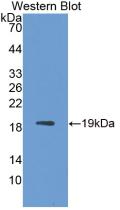Monoclonal Antibody to Interleukin 1 Receptor Antagonist (IL1RA) 

IL1RN; IL1-RA; ICIL1RA; IL1ra3; IL1F3; IRAP;IL-1RA; Interleukin-1 Family Member 3; IL1 inhibitor; Anakinra
- UOM
- FOB US$ 128.00 US$ 298.00 US$ 426.00 US$ 1,065.00 US$ 4,260.00
- Quantity
Overview
Properties
- Product No.MAA223Si21
- Organism SpeciesRhesus monkey (Simian) Same name, Different species.
- ApplicationsWB; IHC; ICC; IP.
If the antibody is used in flow cytometry, please check FCM antibodies.
Research use only - DownloadInstruction Manual
- CategoryCytokineSignal transductionInfection immunity
- SourceMonoclonal antibody preparation, Host Mouse
- Ig Isotype IgG1 Kappa, Clone Number 1:270000 (8-1#)
- PurificationProtein A + Protein G affinity chromatography
- LabelNone
- Immunogen RPA223Si01-Recombinant Interleukin 1 Receptor Antagonist (IL1RA)
- Buffer FormulationPBS, pH7.4, containing 0.02% NaN3, 50% glycerol.
- TraitsLiquid, Concentration 1mg/ml
Sign into your account
Share a new citation as an author
Upload your experimental result
Review

Contact us
Please fill in the blank.
Specifity
The antibody is a mouse monoclonal antibody raised against IL1RA. It has been selected for its ability to recognize IL1RA in immunohistochemical staining and western blotting.
Usage
Western blotting: 0.5-2µg/mL;1:500-2000
Immunohistochemistry: 5-20µg/mL;1:50-200
Immunocytochemistry: 5-20µg/mL;1:50-200
Optimal working dilutions must be determined by end user.
Storage
Store at 4°C for frequent use. Stored at -20°C in a manual defrost freezer for two year without detectable loss of activity. Avoid repeated freeze-thaw cycles.
Stability
The thermal stability is described by the loss rate. The loss rate was determined by accelerated thermal degradation test, that is, incubate the protein at 37°C for 48h, and no obvious degradation and precipitation were observed. The loss rate is less than 5% within the expiration date under appropriate storage condition.
Organism Species More: Homo sapiens (Human)Giveaways
Increment services
-
 Antibody Labeling Customized Service
Antibody Labeling Customized Service
-
 Protein A/G Purification Column
Protein A/G Purification Column
-
 Staining Solution for Cells and Tissue
Staining Solution for Cells and Tissue
-
 Positive Control for Antibody
Positive Control for Antibody
-
 Tissue/Sections Customized Service
Tissue/Sections Customized Service
-
 Phosphorylated Antibody Customized Service
Phosphorylated Antibody Customized Service
-
 Western Blot (WB) Experiment Service
Western Blot (WB) Experiment Service
-
 Immunohistochemistry (IHC) Experiment Service
Immunohistochemistry (IHC) Experiment Service
-
 Immunocytochemistry (ICC) Experiment Service
Immunocytochemistry (ICC) Experiment Service
-
 Flow Cytometry (FCM) Experiment Service
Flow Cytometry (FCM) Experiment Service
-
 Immunoprecipitation (IP) Experiment Service
Immunoprecipitation (IP) Experiment Service
-
 Immunofluorescence (IF) Experiment Service
Immunofluorescence (IF) Experiment Service
-
 Buffer
Buffer
-
 DAB Chromogen Kit
DAB Chromogen Kit
-
 SABC Kit
SABC Kit
-
 Long-arm Biotin Labeling Kit
Long-arm Biotin Labeling Kit
-
 Real Time PCR Experimental Service
Real Time PCR Experimental Service
Citations
- Mucosal imbalance of interleukin-1β and interleukin-1 receptor antagonist in canine inflammatory bowel diseaseScienceDirect: S1090023312000962
- Daily quercetin supplementation over a period of two weeks results in a moderate accumulation of total plasma flavonols in horsesResearchgate:Source
- Synovial Fluid and Serum Concentrations of Interleukin-1 Receptor Antagonist and Interleukin-1Science: Article
- A Two-Week Quercetin Supplementation in Horses Results in Moderate Accumulation of Plasma Flavonol ConcentrationsScience: Article
- Evidence-based review of efficacy and adverse effects of joint medication and evaluation of synovial fluid and serum markers for osteoarthritis in the horsereceive:101658
- Interleukin 1 receptor antagonist and 2′-5′-oligoadenylate synthetase-like molecules as novel biomarkers for multiple sclerosis patients in Bahrainpubmed:29141788
- A similar pro/anti-inflammatory cytokine balance is present in the airways of competitive athletes and non-exercising asthmaticspubmed:28822267
- Winter ambient training conditions are associated with increased bronchial hyperreactivity and with shifts in serum innate immunity proteins in young …Pubmed:29379533
- Effect of interleukin‐1β on occludin mRNA expression in the duodenal and colonic mucosa of dogs with inflammatory bowel diseasePubmed:29572935
- M10, a Myricetin-3-ObD-Lactose Sodium Salt, Prevents Ulcerative Colitis Through Inhibiting Necroptosis in MicePubmed: 33041798






